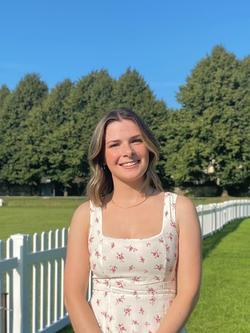Meet Early Career Microbiologist of the Year talk finalist: Phoebe Crossley

What are your current research interests?
My current research interests lie in understanding the vaginal microbiome and the role it plays in maintaining the balance between vaginal health and disease. In my PhD, I use functional genomics to explore host-microbe interactions in Lactobacillus species. While dominance of Lactobacillus in the vaginal microbiome is generally associated with positive health outcomes, such as reduced risk of sexually transmitted infections, bacterial vaginosis, and preterm birth, recent genomic studies have revealed important strain-level differences that may contribute to less favourable outcomes. My work focuses on characterising specific genes in Lactobacillus, particularly those involved in host interactions and glycan utilisation, to decipher the mechanisms driving these strain-level associations and their impact on women’s health.
What inspired you to go into this field of work?
In the 3rd year of my undergraduate degree, I had the incredible opportunity of completing a year-long research placement at the University of Arizona. Having never even heard of the vaginal microbiome before, I quickly discovered not only how crucial it is to women’s health, but also how little we still know about it. I became fascinated by the complex host-microbe interactions within the female reproductive tract and the many ways in which it can influence severe obstetric and gynaecologic conditions. This experience sparked my interest in vaginal microbiome research and inspired me to help advance our understanding of women’s health and address the inequalities within it.
How would you explain your research to a GCSE student?
The vaginal microbiome is the community of microorganisms, mainly bacteria, that live in the vagina. I study a group of vaginal bacteria called Lactobacillus. These are generally considered “good” bacteria as they help protect against infections by other, more harmful bacteria and viruses. However, not all Lactobacillus are the same. Different types have different genes, which cause them to behave in different ways: sometimes supporting health but sometimes causing harm. My research studies the genes that cause Lactobacillus to behave differently and how this affects their relationship with the human body and health outcomes.
What do you love most about your job?
I love the variety of my work, from planning experiments and solving coding problems to keeping up with new research and connecting with others at conferences; there’s always something new to learn. It can be challenging (especially when the science doesn’t go to plan!), but it’s also incredibly fulfilling to think about the potential impact this research could have on women’s health one day. I also get to work with such talented and supportive colleagues and friends, who create a fun and collaborative environment to work in every day.
How do Society events, such as Annual Conference, promote your professional development?
As a new member of the Microbiology Society, I attended my first Annual Conference this year and had the opportunity to present a talk on my undergraduate research and a poster on my PhD project. It was a hugely supportive and encouraging environment to present my first conference talk, and I’m still incredibly honoured to have been nominated as an Early Career Microbiologist talk finalist. The Early Career Forum networking event was also particularly valuable, providing a welcoming space to connect with fellow early-career microbiologists and build connections I hope to maintain at future conferences.
You can find and follow Phoebe on Bluesky: @phoebecrossley.bsky.social and Linkedin: Phoebe Crossley
